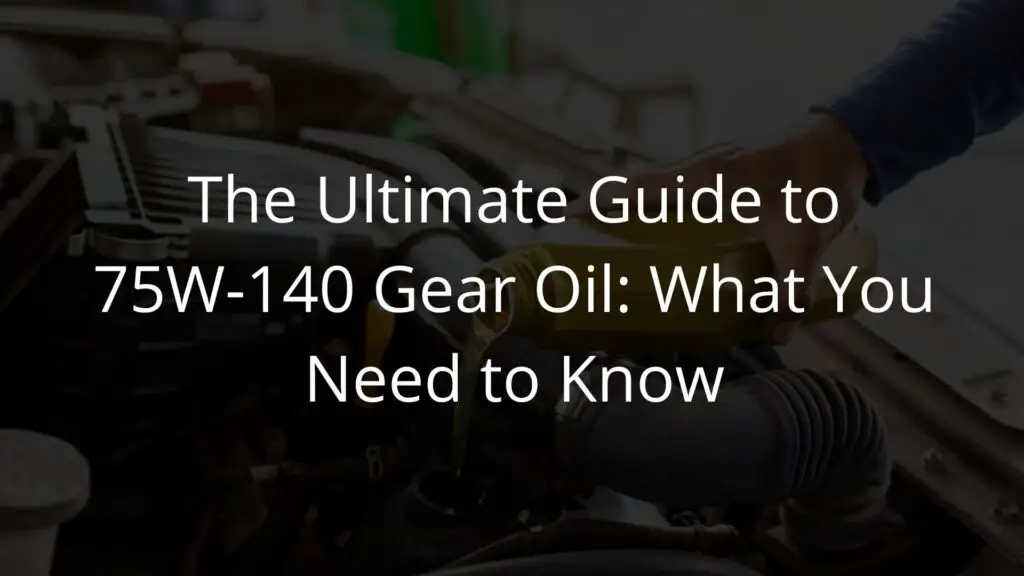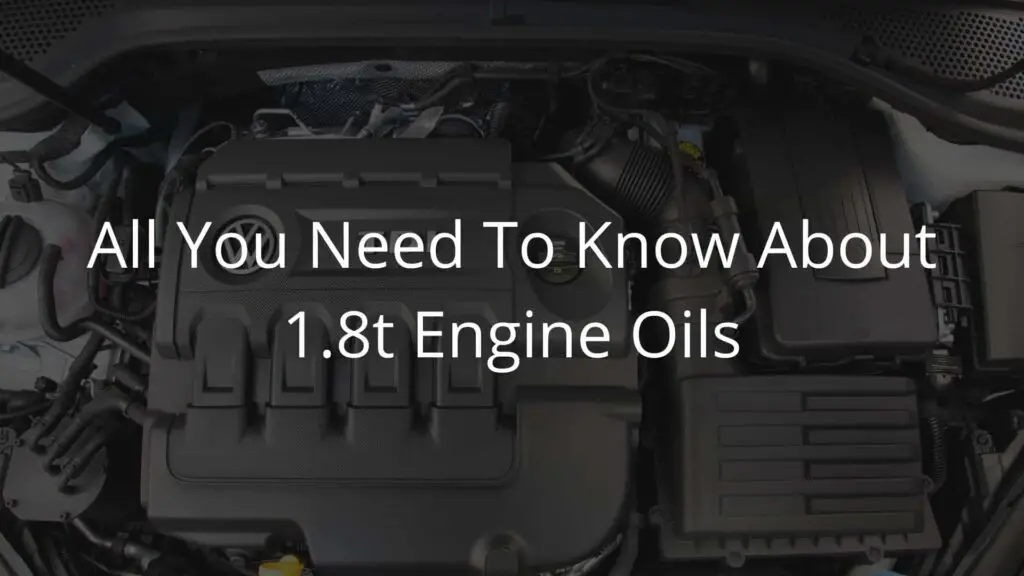“75W-140 gear oil” is a crucial component for maintaining the health and performance of vehicle transmissions and differentials. This specialized lubricant, with its unique viscosity rating, plays a vital role in ensuring smooth gear operation, minimizing wear and tear, and enhancing overall drivetrain longevity.
In this guide, we delve into the world of 75W-140 gear oil, exploring its characteristics, applications, top products, and essential considerations to help you make informed choices when it comes to caring for your vehicle’s vital components.
What Does 75W-140 Gear Oil Mean?
75W-140 gear oil is a high-viscosity lubricant designed for use in automotive differentials and manual transmissions. The “75” in the name refers to its viscosity rating at lower temperatures, where it flows like a 75-weight oil, making it suitable for cold starts. The “140” represents its viscosity at higher temperatures, providing robust protection under heavy loads and high operating temperatures. This gear oil is commonly used in vehicles that require heavy-duty lubrication, such as trucks, SUVs, and performance cars. It offers excellent wear protection, thermal stability, and durability, making it ideal for demanding applications where extreme pressure conditions are encountered.
What are the Technical Specifications of 75W-140 Gear Oil?

75W-140 gear oil typically adheres to industry-standard technical specifications to ensure proper performance and compatibility. These specifications include:
- Viscosity: It has a low-temperature (W) viscosity of 75 and a high-temperature viscosity of 140, which indicates its flow characteristics in cold and hot conditions.
- API Rating: Most 75W-140 gear oils meet or exceed the American Petroleum Institute (API) GL-5 rating, indicating their suitability for high-pressure and heavy-duty applications.
- Extreme Pressure (EP) Additives: They contain EP additives to prevent wear and provide protection against extreme pressure conditions commonly encountered in gearboxes and differentials.
- Thermal Stability: These oils are formulated to withstand high temperatures without breaking down, ensuring long-lasting lubrication.
- Compatibility: They are designed for use in various vehicle differentials, manual transmissions, and some industrial equipment, making them versatile lubricants for heavy-duty applications.
Best 75W-140 Gear Oils
When choosing a 75W-140 gear oil, consider your vehicle’s specific requirements, operating conditions, and the manufacturer’s recommendations. Here are the top 5 75W-140 gear oils.
1. Best Overall: Royal Purple Max Gear 75W-140 Gear Oil
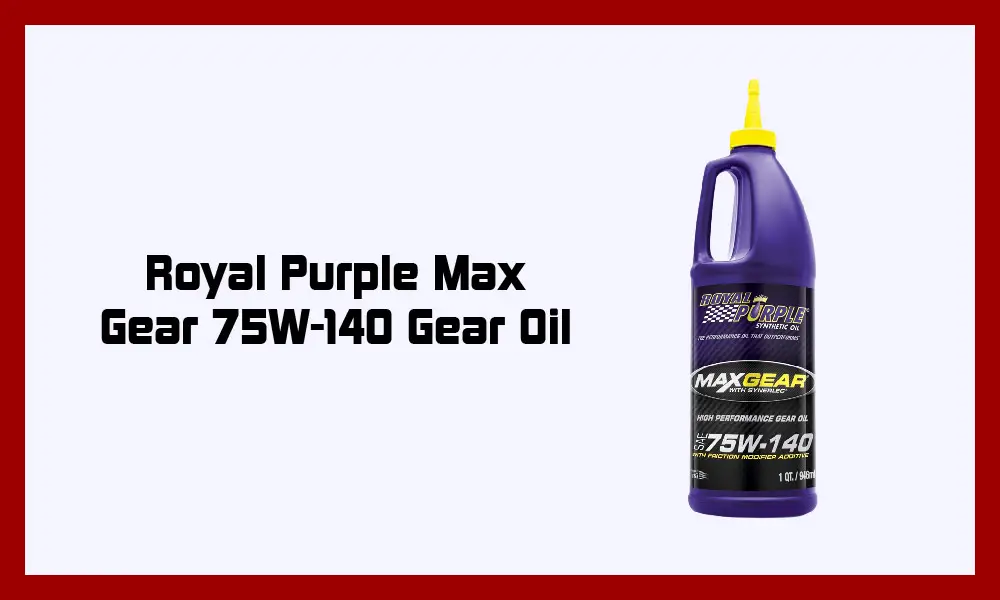
Royal Purple Max Gear 75W-140 is a high-quality synthetic gear oil designed for superior performance and protection. It is suitable for a wide range of vehicles, from everyday drivers to heavy-duty trucks and off-road vehicles. This gear oil is formulated with Royal Purple’s proprietary Synerlec additive technology, providing excellent wear protection and improved thermal stability.
Pros
- Exceptional wear protection, reducing friction and heat.
- Synerlec additive technology enhances performance and extends gear life.
- Suitable for both limited-slip and conventional differentials.
- Works well in extreme temperature conditions.
- Highly regarded for smooth gear shifting.
Cons
- Higher price point compared to some other options.
- Not compatible with all vehicle specifications; always check your manual.
2. Best Performance: Valvoline Flexfill Full Synthetic 75W-140

Valvoline Flexfill Full Synthetic 75W-140 is engineered for maximum performance in high-stress applications. This full synthetic gear oil offers exceptional thermal stability and protection against wear and corrosion. It is suitable for both conventional and limited-slip differentials, ensuring smooth and reliable operation under various driving conditions.
Pros
- High-performance synthetic formula.
- Excellent thermal stability, reducing heat-related wear.
- Protects against corrosion and oxidation.
- Versatile, suitable for various vehicles.
- Reliable gear shifting and performance.
Cons
- Relatively higher price point.
- May not be readily available in all stores.
3. Best Value: Redline 75W-140 Gear Oil

Redline 75W-140 Gear Oil is a cost-effective choice that doesn’t compromise on quality. This gear oil is known for its strong performance in extreme conditions, providing superior protection for gears and bearings. It is a full synthetic formula that meets GL-5 specifications, making it suitable for a wide range of vehicles.
Pros
- Affordable without sacrificing performance.
- Excellent protection against wear and corrosion.
- Ideal for both street and track use.
- Maintains viscosity under high temperatures.
- Compatible with most gear types.
Cons
- Some users may prefer brands with a more extensive track record.
- May require additional additives for limited-slip differentials.
4. Best Performance: TORCO SGO Racing Gear Oil
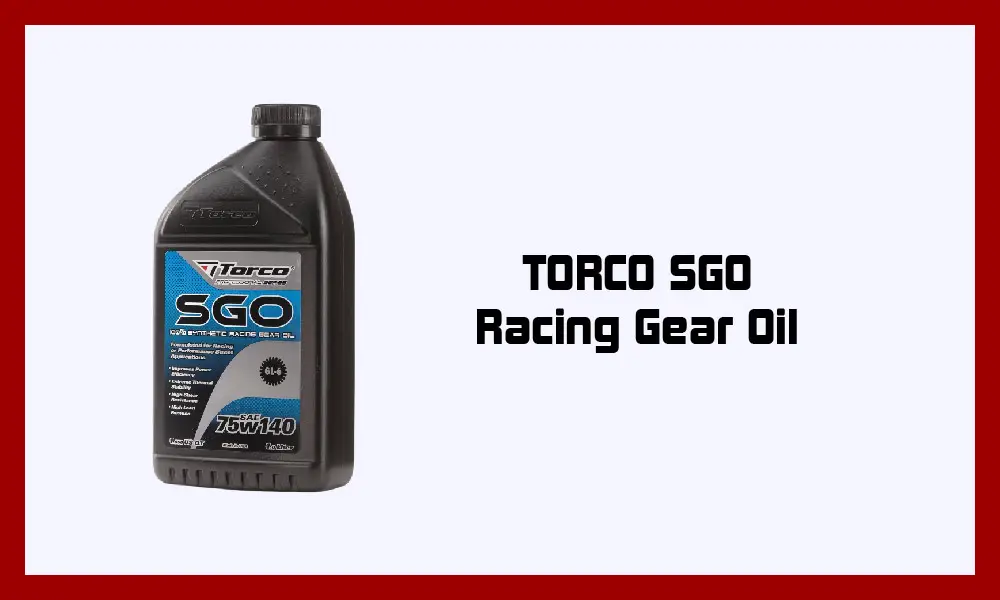
TORCO SGO Racing Gear Oil is a premium synthetic gear oil designed for high-performance applications. It is an excellent choice for racing and track enthusiasts who demand the utmost protection and performance from their gear lubricant. This gear oil offers superior thermal stability, reduced friction, and exceptional wear protection.
Pros
- Engineered for racing and high-stress situations.
- Provides outstanding wear and friction reduction.
- Enhanced thermal stability for extreme conditions.
- Suitable for both manual transmissions and differentials.
- Trusted by performance enthusiasts.
Cons
- Relatively higher price point.
- May not be necessary for everyday driving.
5. Best for Old Transmission: Lucas Oil 75W-140 Gear Oil
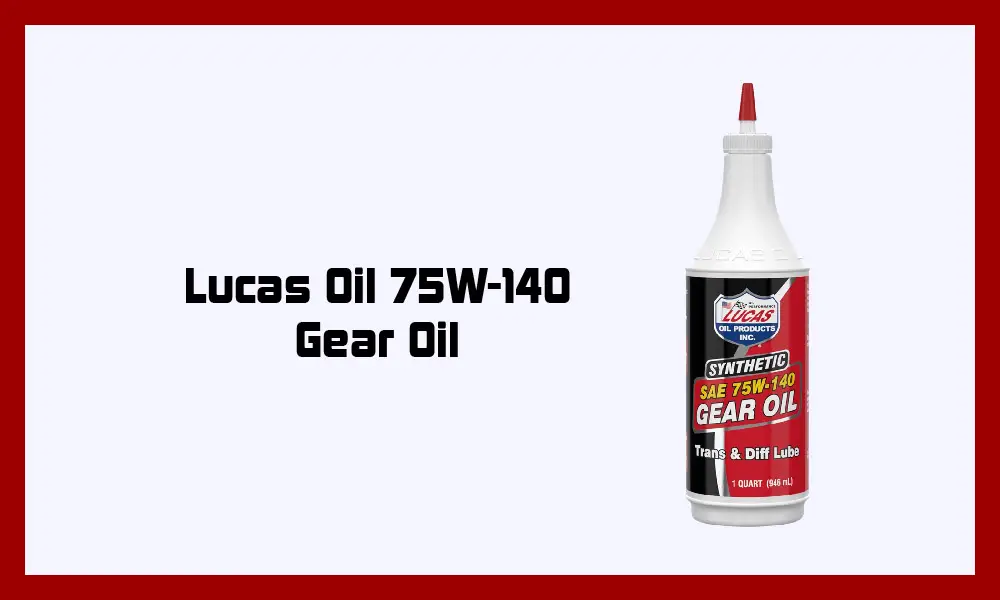
Lucas Oil 75W-140 Gear Oil is a synthetic blend specifically formulated for older transmissions and differentials. It is designed to rejuvenate and protect aging gear systems, reducing noise and enhancing performance. This gear oil is compatible with conventional and limited-slip differentials, making it an excellent choice for older vehicles.
Pros
- Formulated for older transmissions and differentials.
- Reduces gear noise and improves shifting.
- Synthetic blend enhances wear protection.
- Affordable option for older vehicle maintenance.
- Trusted Lucas Oil brand.
Cons
- May not be necessary for newer vehicles.
- Limited availability in some regions.
How to Replace 75W-140 Gear Oil?

Replacing 75W-140 gear oil is an essential maintenance task for vehicles with differentials and manual transmissions. Here’s a general guide on how to replace it:
Step 1: Gather Supplies
Collect the necessary tools and supplies, including a socket wrench, a drain pan, a funnel, a container for the old oil, a new bottle of 75W-140 gear oil, and safety gear like gloves and safety glasses.
Step 2: Prepare the Vehicle
Park the vehicle on a level surface and engage the parking brake. If you’re working on a lifted truck or SUV, ensure it’s safely supported on jack stands. Also, consult your vehicle’s manual to locate the gear oil drain and fill plugs.
Step 3: Drain the Old Gear Oil
Position the drain pan under the differential or transmission, and then use a socket wrench to remove the drain plug. Allow the old gear oil to drain completely. Clean the drain plug and replace any gaskets or washers if necessary.
Step 4: Refill With New Gear Oil
Insert a funnel into the fill hole and carefully pour in the new 75W-140 gear oil until it reaches the recommended level, which can typically be found in the vehicle’s manual. Replace the fill plug and tighten it securely. Double-check for any leaks.
Step 5: Dispose the Old Oil Responsibly
Dispose of the old gear oil at a recycling center or an automotive service shop that accepts used oil. Do not discard it in the environment.
Step 6: Final Checks
Start the vehicle and allow it to run for a few minutes to circulate the new gear oil. Check for any leaks around the drain and fill plugs. Finally, confirm that the gear oil level is correct, and you’re done.
Always consult your vehicle’s manual for specific instructions and torque specifications, as they can vary between makes and models.
Final Thoughts: High-Performance 75W-140 Gear Oil for Optimal Lubrication
In conclusion, “75W-140 gear oil” stands as a vital ally in the maintenance and longevity of vehicle transmissions and differentials. Its high-viscosity formulation, tailored for a range of applications, ensures optimal gear protection and performance. Whether you seek superior wear resistance, thermal stability, or smooth gear shifting, choosing the right 75W-140 gear oil is crucial. By understanding its significance and exploring top-rated products, you can safeguard your vehicle’s drivetrain, ensuring years of reliable operation and peace of mind on the road.
For more information, explore our blog on engine oils.

